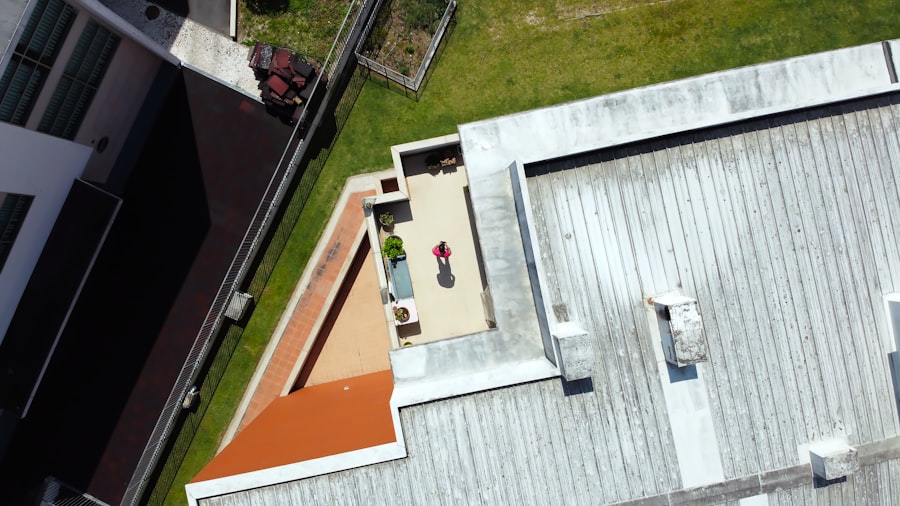The commercial roofing market is a dynamic sector characterized by a diverse range of materials, technologies, and services tailored to meet the needs of various businesses. This market encompasses a wide array of roofing systems, including flat roofs, sloped roofs, and specialized installations such as green roofs and solar panel systems. The demand for commercial roofing is influenced by several factors, including economic conditions, construction trends, and advancements in roofing technology.
As businesses expand and new commercial properties are developed, the need for reliable and durable roofing solutions becomes increasingly critical. In recent years, sustainability has emerged as a significant trend within the commercial roofing market. Many businesses are seeking eco-friendly roofing options that not only reduce their carbon footprint but also offer long-term cost savings through energy efficiency.
This shift towards sustainable practices has led to the rise of innovative materials such as cool roofing systems, which reflect sunlight and reduce heat absorption, and green roofs that incorporate vegetation to improve insulation and manage stormwater. Understanding these trends is essential for roofing contractors and businesses looking to position themselves effectively within this competitive landscape.
Key Takeaways
- Know the commercial roofing market dynamics to tailor your business approach effectively.
- Identify and focus on specific customer segments and niches for targeted marketing.
- Build a strong brand and professional image to stand out in a competitive market.
- Use digital marketing tools and strategies to reach and engage potential clients.
- Cultivate relationships and leverage customer testimonials to boost credibility and sales.
Identifying Target Customers and Niches
Identifying target customers is a crucial step in establishing a successful commercial roofing business. The commercial sector is vast, encompassing various industries such as retail, healthcare, education, and manufacturing. Each of these sectors has unique roofing needs and challenges that must be addressed.
For instance, a retail establishment may prioritize aesthetics and energy efficiency to attract customers, while a manufacturing facility may focus on durability and resistance to industrial pollutants. By segmenting the market based on industry-specific requirements, roofing contractors can tailor their services to meet the distinct needs of each customer group. Moreover, niche markets within the commercial roofing sector present lucrative opportunities for specialized contractors.
For example, the healthcare industry often requires roofing systems that comply with stringent regulations regarding hygiene and safety. Contractors who understand these specific requirements can position themselves as experts in healthcare roofing solutions. Similarly, the growing trend of green building practices has created a niche for contractors who specialize in sustainable roofing options.
By identifying and targeting these niches, businesses can differentiate themselves from competitors and establish a strong foothold in the market.
Developing a Strong Brand and Image

A strong brand and image are vital components of success in the commercial roofing market. Branding goes beyond just a logo or company name; it encompasses the overall perception that customers have of a business. A well-defined brand communicates reliability, quality, and expertise, which are essential attributes in the roofing industry.
To develop a compelling brand, contractors should focus on creating a unique value proposition that highlights their strengths and differentiates them from competitors. This could involve emphasizing specialized skills, innovative materials, or exceptional customer service. In addition to establishing a strong brand identity, maintaining a professional image is equally important.
This includes everything from the appearance of company vehicles and uniforms to the quality of marketing materials and online presence. Consistency in branding across all platforms helps build trust with potential customers. For instance, a contractor that showcases high-quality images of completed projects on their website and social media channels can create a visual narrative that reinforces their expertise.
Furthermore, engaging in community initiatives or sponsorships can enhance a company’s image as a responsible and trustworthy business.
Utilizing Digital Marketing Strategies
| Digital Marketing Strategy | Key Metrics | Typical Performance Range | Purpose |
|---|---|---|---|
| Search Engine Optimization (SEO) | Organic Traffic, Keyword Rankings, Bounce Rate, Conversion Rate | Organic Traffic Growth: 10-30% monthly Conversion Rate: 2-5% |
Increase website visibility and attract targeted visitors |
| Pay-Per-Click Advertising (PPC) | Click-Through Rate (CTR), Cost Per Click (CPC), Conversion Rate, Quality Score | CTR: 2-5% Conversion Rate: 3-10% |
Drive immediate traffic and conversions through paid ads |
| Content Marketing | Engagement Rate, Time on Page, Social Shares, Lead Generation | Engagement Rate: 1-3% Lead Generation: varies by industry |
Build brand authority and nurture audience relationships |
| Email Marketing | Open Rate, Click-Through Rate, Unsubscribe Rate, Conversion Rate | Open Rate: 15-25% CTR: 2-5% Unsubscribe Rate: <1% |
Engage and convert subscribers through targeted messaging |
| Social Media Marketing | Follower Growth, Engagement Rate, Reach, Conversion Rate | Engagement Rate: 1-4% Follower Growth: 5-10% monthly |
Increase brand awareness and foster community interaction |
| Affiliate Marketing | Number of Affiliates, Conversion Rate, Revenue Share, Clicks | Conversion Rate: 1-5% Clicks: varies widely |
Expand reach through partner promotions and referrals |
In today’s digital age, effective marketing strategies are essential for reaching potential customers in the commercial roofing sector. Digital marketing offers a range of tools and techniques that can significantly enhance visibility and engagement with target audiences. One of the most effective strategies is search engine optimization (SEO), which involves optimizing website content to rank higher in search engine results.
By incorporating relevant keywords related to commercial roofing services, contractors can increase their chances of being discovered by businesses seeking roofing solutions. Social media platforms also play a crucial role in digital marketing for commercial roofing companies. Platforms like LinkedIn, Facebook, and Instagram allow contractors to showcase their work, share industry insights, and engage with potential clients directly.
Regularly posting updates about completed projects or sharing informative content about roofing maintenance can position a company as an authority in the field. Additionally, paid advertising on social media can target specific demographics or industries, ensuring that marketing efforts reach the right audience effectively.
Networking and Building Relationships
Networking is an indispensable aspect of growing a successful commercial roofing business. Building relationships with other professionals in related industries can lead to valuable partnerships and referrals. For instance, establishing connections with general contractors, architects, or real estate developers can create opportunities for collaboration on larger projects.
Attending industry trade shows, conferences, and local business events provides an excellent platform for networking and showcasing expertise. Moreover, maintaining relationships with existing clients is equally important for long-term success. Regular communication with past customers can lead to repeat business or referrals to new clients.
Implementing a customer relationship management (CRM) system can help track interactions with clients and streamline communication efforts. By nurturing these relationships through follow-up calls or personalized emails, contractors can foster loyalty and trust among their customer base.
Leveraging Customer Testimonials and Referrals

Customer testimonials and referrals are powerful tools for building credibility in the commercial roofing market. Positive feedback from satisfied clients serves as social proof that can influence potential customers’ decisions. Contractors should actively seek testimonials from clients after completing projects and showcase these endorsements on their websites and marketing materials.
Video testimonials can be particularly impactful, as they provide an authentic glimpse into the customer experience. Referrals are another valuable source of new business in the roofing industry. Satisfied customers are often willing to recommend contractors to their peers if they have had a positive experience.
To encourage referrals, businesses can implement incentive programs that reward clients for referring new customers. This could involve offering discounts on future services or gift cards as tokens of appreciation. By leveraging testimonials and referrals effectively, contractors can enhance their reputation and attract new clients through trusted recommendations.
Implementing Effective Sales Techniques
Sales techniques play a pivotal role in converting leads into customers within the commercial roofing sector. Understanding the unique needs of each potential client is essential for tailoring sales pitches effectively. Active listening during initial consultations allows contractors to identify specific pain points or requirements that need addressing.
By demonstrating empathy and understanding, sales representatives can build rapport with potential clients and position themselves as trusted advisors rather than just salespeople. Additionally, providing detailed proposals that outline project scope, timelines, and costs can instill confidence in potential customers. Transparency in pricing helps eliminate any uncertainties that may arise during the decision-making process.
Offering financing options or flexible payment plans can also make it easier for businesses to commit to roofing projects without straining their budgets. Ultimately, effective sales techniques hinge on building relationships based on trust and delivering value throughout the sales process.
Measuring and Analyzing Marketing ROI
Measuring and analyzing marketing return on investment (ROI) is crucial for understanding the effectiveness of various strategies employed by commercial roofing businesses. By tracking key performance indicators (KPIs) such as lead generation rates, conversion rates, and customer acquisition costs, contractors can gain insights into which marketing efforts yield the best results. For instance, if digital marketing campaigns consistently generate high-quality leads at a lower cost than traditional advertising methods, it may be prudent to allocate more resources toward digital initiatives.
Utilizing analytics tools can provide valuable data regarding website traffic, social media engagement, and email campaign performance. By analyzing this data regularly, businesses can make informed decisions about where to focus their marketing efforts moving forward. Additionally, conducting surveys or gathering feedback from clients about how they discovered the company can help identify which channels are most effective for reaching target audiences.
Ultimately, measuring marketing ROI enables contractors to refine their strategies continually and maximize their return on investment over time.




